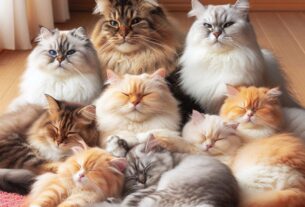Table of Contents
ToggleBest Nutrition for Cats: Fueling Your Feline
Introduction
A healthy and balanced nutrition for cats is essential for their overall well-being. Cats’ bodies are also designed to eat a diet rich in animal fat and protein. Cats hunt and explore many places. A balanced and protein-rich diet is required to provide them energy. Cats are not as efficient at converting plant-based resources into useful energy as people or dogs are. Cats can live a long and healthy life only by eating a balanced diet containing protein. In this article we described briefly about the best nutritious for cats:
Proteins:
Proteins are essential for cat’s diet, providing essential amino acids for growth, repair, and energy. Cats use only Proteins as a primary energy source. Touring the Amino acid is vital for heart and eye health must be included in cat’s diet. Aim for food with a minimum of 25% protein content (higher for kittens and pregnant/nursing cats).
Fats:
Fats provide dense source of energy therefore cats need higher energy as compared to other animals. Fats also supports healthy skin and coat through essential fatty acid like arachidonic acid. However, while fats are important nutrition for cats, maintaining a healthy balance is key, as excessive fat intake can lead to obesity and related health issues.
Carbohydrates:
Carbohydrates add bulk to commercial cat food and can provide quick source of energy. But it needed in minimal amounts for energy, BCZ excess carbs can lead to obesity and other health issues, it’s essential to ensure that a cat’s diet is primarily based on high-quality animal proteins and fats, with minimal carbohydrates.
Vitamins and Minerals:
Vitamin and minerals are very important nutrition for cats for various bodily functions and overall cat’s health. It also supports various physiological functions and important for immune functions, vision, cell protection and blood clotting etc. Without these vitamins and minerals cat can’t maintain proper bodily functions. These vitamins can be proved better for the nutrition of your cats.
Water:
They need water to live just like humans. Though they may not seem as thirsty as other pets, about 60-70% of a cat’s body is composed of water. This essential fluid affects their bodily functions including digestion, transportation of nutrients, organ operation and blood circulation. Wild cats obtain moisture from their prey while domesticated ones rely on us to provide them with freshwater. Dry food has low moisture content hence it is important that we have a constant source of fresh water nearby. Proper hydration prevents urinary tract problems which are common in felines.
The best way to fuel your cat if it doesn’t take much water, there are the

things that one should do.
These may include buying a wider dish for the purpose or placing it away from food dishes or buy a drinking fountain for them or even add some little bit of water in their wet foods which can be helpful in hydrating them more. By observing how much water your pet drinks per day and offering variety, you can keep it happy and we’ll all through its lifetime.
Cuisine Selections:
Dry Food:
Dry food is a good option for cat owner because of its convenience. Dry food is generally less moist, so it is ensuring that your cat has access to fresh water. Dry food is also good for dental health as compared to wet food.
Wet Food:
The more moistness it has the better it is for you to drink, so a wet food plays an important part in a cat’s nutrition. Keep some clean water bowls for cats at different parts of your home, thus making them take less water in contrary to body temperature. Water helps to absorb nutrients and is also a guard against kidney and urinary diseases.
Raw Food:
Raw means bones, organs and sometimes Vegetables and supplements. It causes nutrients balance by providing high level of proteins in cats and minimize the risk of contamination. Raw food replicates a cat’s natural diet, but requires proper preparations, it can be more expensive than dry food.
Considering Feeding:
Age:
In determining the appropriate diet of cat’s age is a crucial factor. Senior cats may benefit from a particular diet, although kittens require more calories and nutrients for their rapid growth and development than adult cats do while adult cats need balance diet to maintain their health and prevent obesity.
Activity Level:
Cats that are more active need more calories to sustain their energy level and support muscle health than those who are playful but less energetic needs a sufficient nutrient AMD energy while less active or less playful cats require fewer calories to control their weight for healthy living.
Health disorders:
*A certain diet may be required for some medical disorders. Seek advice from your veterinarian.
Feeding Schedule:
To prevent overeating, give free-feeding cats small meals spaced throughout the day or a portion restriction.
Conclusion
The bottom line is that feline nutrition essentially involves feeding them with a balanced diet, which takes their particular needs into account as obligate carnivores. This will keep their muscles in shape and maintain their general wellbeing, which fats are responsible for. In some cases, carbohydrates are allowed albeit not in excessive quantities. To prevent dehydration and keep them healthy, cats always need water. You can guarantee that your feline companion will have a long life if you understand these dietary requirements and consult your vet.





